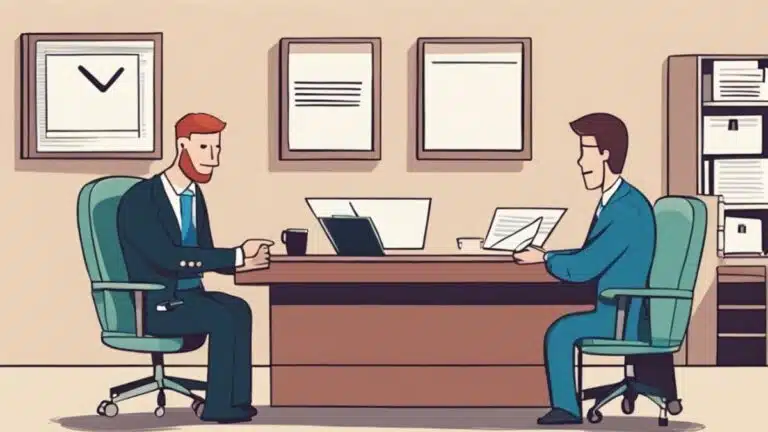You found our guide to how to prepare for an interview.
Preparing for an interview ensures applicants make a good impression. This process can include researching the company and practicing interview questions. The purpose of these steps is to demonstrate competence and professionalism. These steps are also known as “acing an interview” and “how to answer common interview questions.”
These tips on how to prepare for an interview are similar to interview questions, virtual interview tips, and networking icebreaker questions.

This article covers:
- acing an interview
- getting ready for an interview
- how to answer common interview questions
- how to interview well
- interview prep tips
- interview preparation checklist
Let’s get to it!
List of how to prepare for an interview (steps)
From knowing the job description to having confidence, this guide provides helpful information about getting ready for an interview.
1. Know the Job Description
Understanding the job description is one of the most important interview prep tips. This description provides insight into your potential roles and responsibilities. When reviewing the listing, pay attention to the skills required. Employers may ask how you meet those requirements. This knowledge demonstrates interest and preparation, improving your chances of success.
2. Research the Company
Understanding the organization’s mission, services, and goals before your interview is crucial. First, check the firm’s website and social media platforms. A good place to check on the website is the About page. This page often includes information on the company’s mission, values, and team members. Social media gives you more insight into how the firm interacts with customers. This knowledge will help you understand how to interact in the interview, like being formal or casual.
With these tools, you can see what the company aims to do and how they accomplish those goals. This knowledge will help to tailor your responses to match the company’s values. Responses like this will solidify the idea that you would be an excellent fit for the company.
Get our free team building toolbox
- icebreaker games
- bingo cards
- DIY guides
 by teams at FedEx, Amazon, Deloitte and 73,930+ others
by teams at FedEx, Amazon, Deloitte and 73,930+ others

3. Understand the Interview Structure
When getting ready for an interview, knowing the structure is a helpful way to prepare.
Here are a few steps that you may encounter:
- Introduction: Share brief self-introductions and icebreaker questions to set a comfortable tone.
- Background: Discuss your education, work history, and notable achievements.
- Behavioral: Share specific examples of how you have handled challenges in the past.
- Technical: Answer questions related to your expertise or problem-solving skills.
- Hypothetical: Explain how you would approach hypothetical situations or challenges.
- Cultural Fit and Motivation: Discuss your alignment with the company culture and your motivations for applying.
- Questions for Interviewer: Ask thoughtful questions to learn more about the role and company.
- Closing Remarks: Express gratitude, reiterate interest, and inquire about the next steps in the process.
Understanding this flow can help you plan responses and emphasize your skills.
4. Plan Your Journey
Being on time or early to an interview is a simple tip for acing an interview. When planning your interview, look up your route ahead of time. To go the extra mile, follow your route prior to the meeting. That way, you know approximately how long it will take to get there. When heading to the location before the interview, remember to go at around the same time of day. That way, you can plan for any traffic or delays. With this step, you will ensure you can show up on time and stand out.
5. Dress Accordingly
When heading to an interview, ensure your outfit matches the company culture. If you applied to a corporate role, then opt for a business suit. For creative industries, show some personality but keep it professional. Be sure to always appear neat, tidy, and well-groomed. First impressions count, so make sure you present yourself as a potential asset to the company.
6. Practice Common Interview Questions
If you are wondering how to answer common interview questions, then remember to practice. This stage helps you express your thoughts clearly and confidently.
Here are some common interview questions:
- Can you tell me about yourself?
- What are your strengths and weaknesses?
- Why are you interested in this company?
- Describe a time when you faced a challenge and how you overcame it.
- Tell me about a time when you worked successfully in a team.
By rehearsing answers, you can increase your self-confidence. Moreover, practicing familiar interview questions helps you improve your responses for greater impact.
Here are the most common interview questions and how to answer them.
7. Understand Nonverbal Communication
Understanding nonverbal communication is essential when preparing for an interview. Nonverbal cues such as body language, facial expressions, and eye contact can share as much information as spoken words.
During your interview, pay attention to your posture and maintain good eye contact. Other strong nonverbal cues include firm handshakes and confident smiles. Practicing good nonverbal communication can help you make a positive impression on your potential employer.
8. Practice Preinterview Meditation
Practicing preinterview meditation can significantly lower stress levels and improve focus. This practice can relax you and provide mental clarity, both of which sharpen responses. Leading up to the job interview, practice deep-breathing exercises or guided meditation regularly. Meditation apps and videos can help guide you through this process. During the meeting, you will feel more calm, allowing your best qualities to shine.
9. Be Confident
Being confident can be difficult, but this attitude helps you put your best foot forward. To show confidence in an interview, have good posture, maintain eye contact, and speak clearly. Confidence helps you demonstrate your skills and qualifications to potential employers. Self-assurance is not about perfection but about trusting yourself and your abilities. Be sure to embrace your strengths and present them confidently during the interview process.
10. Bring Necessary Documentation
When making an interview preparation checklist, remember to bring the paperwork you need. Bringing essential documents to an interview will show potential employers how organized you are.
These papers include copies of your resume, reference letters, and records of past achievements. If applicable, you can also bring a portfolio showcasing your work. Documentation showing any special qualifications or licenses is also beneficial. Be sure to bring copies that the interviewer can keep.
11. Demonstrate Your Skills
Highlighting your skills during an interview is crucial. It is important to provide clear examples of moments where you have used your abilities well. For example, consider sharing information about solving problems, spearheading initiatives, or connecting with clients.
Before the meeting, reflect on past experiences to have stories at the ready. These tales should illustrate your skills, ensuring they match the employer’s needs.
Here are examples of leadership skills and employee soft skills, for instance.
12. Ask Good Questions
When getting ready for an interview, plan questions to ask your interviewer. Asking thoughtful questions shows your interest in the role. Before the meeting, take some time to look into the company so you can ask insightful questions.
Here are a few examples:
- What are the short-term and long-term goals for this position?
- How do you measure success in this role?
- How would you describe the company culture?
- What is your favorite part about working for this firm?
- What opportunities are there for advancement within the company?
By asking considerate questions, you can gain valuable insights into the company’s culture and expectations. This step will help you see if the job is a good fit for your expectations as well.
13. Address Weaknesses
Even though this question is hard to answer, interviewers often ask what your greatest weakness is. Identifying and acknowledging your weaknesses shows self-awareness during an interview. Instead of denying weaknesses, show how you are working on them.
You should use concrete examples and show how these weaknesses have turned into learning opportunities. For example, if you struggle with time management, then you can try different productivity tools to stay on track. Responding to this question thoughtfully shows resilience and dedication to personal growth.
14. Showcase Achievements
When researching how to interview well, be sure to list your successes. Ultimately, the point of interviewing is to showcase your achievements. During the meeting, highlight your awards, recognitions, or successful projects.
Consider bringing in examples if you have them. For instance, writers can show examples of previous publications. Another option is to show statistics and facts from projects you have worked on. If your efforts contributed to more sales at your last company, then you can share that info with interviewers. These achievements show your ability to perform and excel in your field.
15. Discuss Salary
When preparing for an interview, consider potential discussion around salary. You can start by researching the average pay scale for the role you are applying for. Be sure to check salaries in your area, as this number can vary greatly by location.
When the topic of salary comes up, be ready to talk about what you are hoping to earn based on your research and needs. It is essential to be polite and confident when discussing money. However, if you plan to negotiate, prepare to explain why you believe you deserve a certain salary.
16. Close the Interview
To effectively close the interview, start by thanking the interviewer for their time. In addition, express your continued interest in the position. Also, ask about the next steps in the hiring process to show your eagerness and proactive attitude. Concluding an interview well creates a lasting impression on potential employers. This step demonstrates your professionalism and genuine interest in the opportunity.
17. Follow Up
After completing your interview, remember to follow up within 48 hours. This step reinforces your interest in the job and leaves a positive impression. You can send a thank you email expressing your gratitude for the opportunity. In your message, mention specific points you enjoyed discussing, showing your attentiveness. You can also reiterate certain reasons why you think you would be a great fit for the role. Timely follow-ups can increase your chances of landing the job.
18. Network
After your interview, it is a good idea to maintain connections with the folks you met directly and others at the company you applied for. Consider reaching out to employees in similar roles or departments. In your message, share your interest in the company and willingness to learn more about their experiences.
Additionally, continue networking within your field to keep connections open. This process also keeps you updated on industry trends and opportunities. Networking is about building relationships, so be genuine and proactive in your interactions. By staying connected, you can expand your professional network and increase your chances of finding job opportunities.
Final Thoughts
Preparing for an interview is more than just answering questions. This process involves understanding the job role, researching the company, and dressing up. By following these steps, you increase your chances of success. Preparation demonstrates competence, preparedness, and professionalism.
Next, check out our posts on unusual icebreaker questions, employee engagement survey questions, and company culture survey questions.



